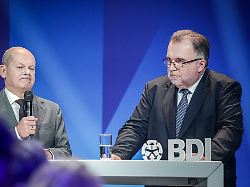“Germany falls behind”
BDI gives traffic light bad testimonials
06/19/2023, 4:47 p.m
Germany’s competitiveness is crumbling, the economy is stagnating – also because of record electricity prices. In his speech on Industry Day, Chancellor Scholz found no answer to the list of deficiencies that the BDI wrote in the logbook for the traffic light.
German industry sees increasing dangers for Germany as a business location and is dissatisfied with the course of the traffic light coalition. The country is facing a “mountain” of growing challenges, said BDI President Siegfried Russwurm at Industry Day in Berlin. “The impatience and uncertainty of many entrepreneurs are increasing.” Politicians must tackle structural reforms systematically.
The President of the Federation of German Industries (BDI) said that more and more German companies, including small and medium-sized ones, are looking to extract part of their added value from Germany. According to Russwurm, companies are increasingly overwhelmed with the current electricity prices or energy prices in global competition. The BDI expects the federal government to come up with a concept that can be implemented quickly and that will guarantee a secure supply of electricity at internationally competitive costs in the long term.
“The state drives up the price of electricity”
A solution for a few years – like the industrial electricity price that is being considered, although controversial within the government – is not enough. During the election campaign, Scholz spoke of an electricity price of four cents, which is now miles away. “The many state-induced burdens such as taxes, levies and grid fees must be reduced in order to make electricity more attractive than fossil fuels.” The BDI criticized the state for first driving up the price and then subsidizing it down again.
The “Germany speed” promised by Chancellor Olaf Scholz has so far not been fulfilled, with the exception of the construction of liquid gas terminals. The BDI President called for the planning and approval procedures to be speeded up, better tax conditions for investments at the location and a sense of proportion in regulation. “Anyone who believes that the energy transition could become the nucleus of a new economic miracle underestimates that the investments will largely only replace an existing capital stock,” said Russwurm. For the time being, the energy transition will not bring any additional economic growth. The BDI expects economic stagnation for the current year. Germany falls behind in international comparison. Scholz, on the other hand, said that because of the high investments in climate protection, high growth rates, like those of the “economic miracle” in the 1950s and 1960s, can be expected.
Chancellor announces austerity course
In his speech at Industry Day, the Chancellor did not address the BDI’s points of criticism. Instead, Scholz announced an austerity course for the coming years. After crisis-related years with “unprecedented borrowing”, the federal government must now return to a solid budgetary policy, said Scholz. Some subsidies and some support programs are being put to the test. After months of arguments within the coalition, Federal Finance Minister Christian Lindner wants to present the budget for 2024 before the parliamentary summer recess. According to Scholz, there will be three priorities in the federal budget: security, climate neutrality and cohesion.
It was right to lead Germany safely through the corona pandemic and through last winter with large aid packages and to initiate billions in investments in the Bundeswehr, said Scholz. “But it’s just as right that we don’t let this exceptional situation become the norm,” said Scholz at the BDI event. “After spending billions as a result of the crisis, we are bringing spending back to a level that we managed well for years before the crises.”
